-
Public media are supported by 50% of the left, 40% of the center and 31% of the right, while for 19% of the left, 26% of the center and 36% of the right they are not important.
-
45% of Spanish Internet users think that public media are important for society, thirteen points below average of nineteen countries (58%).
-
55% of those on the left, 45% of those in the center and 36% of those on the right believe that public media are important for society.
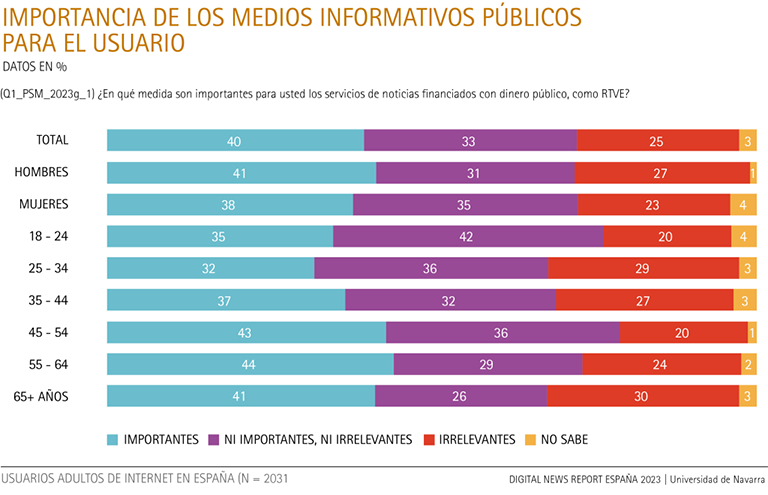
40% of adult Internet users in Spain personally believe that publicly funded news services are important. More men (41%) than women (38%) believe this, although the difference is not significant. Public media are better valued among those over 45 years old, because 43% believe that they are important, compared to 35% among adults up to 44 years old. The difference is significant.
On the other hand, for one in four Internet users (25%) the public media are not important. More men (27%) than women (23%) also think this way, although the difference is not significant. By age, significant differences are found in the 25 to 34 (29%), 35 to 44 (27%) and 65 and over (30%) age groups, while in the 18 to 24 (20%), 45 to 54 (20%) and 55 to 64 (24%) groups the opinion that the public media are not important finds fewer supporters.
In addition, three out of ten (33%) believe that the public media are neither important nor irrelevant. This is higher among women (35%) than among men (31%), but the difference is not significant. This option is more widespread among Internet users between 18 and 34 (38%) than among those over 35 (31%).
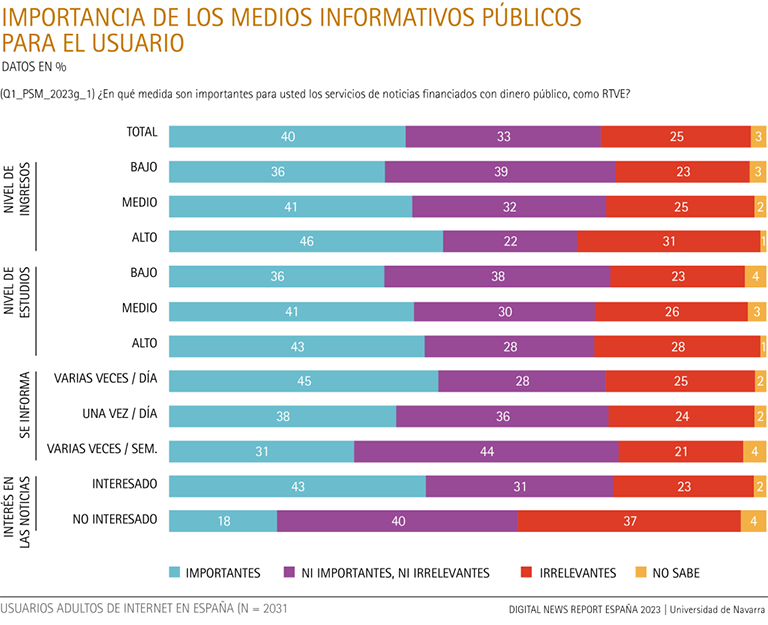
Public media are more important for people with high income, programs of study and high interest.
Those with higher income levels (46%) and programs of study (43%) attach greater importance to them, are more frequently informed (43%) and are interested in current affairs (43%). Differences are also found according to the variables of income, level of programs of study, frequency with which the Internet user accesses online news and interest in news.
According to income level, we found a higher proportion of support among high-income Internet users for both the opinion that public media are important (46%, six points above average, 40%) and the belief that they are irrelevant (31%, six points above average, 25%), with significant differences. On the other hand, in low (39%) and middle (32%) income households we find a higher proportion of indifferent users ( average is 33%) to the relevance of the public media compared to high-income Internet users (22%). The difference is significant.
There are also significant differences in the opinion of the importance or irrelevance of public media according to the variable of the level of programs of study. Likewise, among those with a high level of programs of study the positions are more defined and present significant differences with respect to those with a medium or low level. Thus, among high-level Internet users, 43% support the importance of public media, compared to 36% (below the 40% of average) among those with a low level of training . On the other hand, there is a higher proportion of users among low programs of study users (38%) who think that public media are neither important nor irrelevant; the difference is significant with respect to medium (30%) and low (28%) users.
In addition, a relationship is observed between the variable of the frequency with which they access online news and the importance given to public media by those who inform themselves several times a day (45%), compared to those who inform themselves several times a week (31%); the difference is significant. On the other hand, no significant differences were observed according to the frequency of access with respect to the consideration of the public media as irrelevant. Finally, there is a significant difference between those who receive information once a day (36%) and several times a week (44%) and those who receive information several times a day (28%) in terms of their indifference to the public media.
Finally, those who say they are interested in the news believe more in the importance of public media, four out of ten (43%), compared to two out of ten (18%) who are not interested. On the contrary, a higher percentage of users who do not believe that public media are important is found among those who are not interested in news (37%), than among those interested in news (23%); the difference is significant. Similarly, when faced with the statement that public media are not important, but not irrelevant either, we find four out of ten respondents not interested in the news (40%), and three out of ten (31%) who consider themselves interested in current affairs; this is also a significant difference.
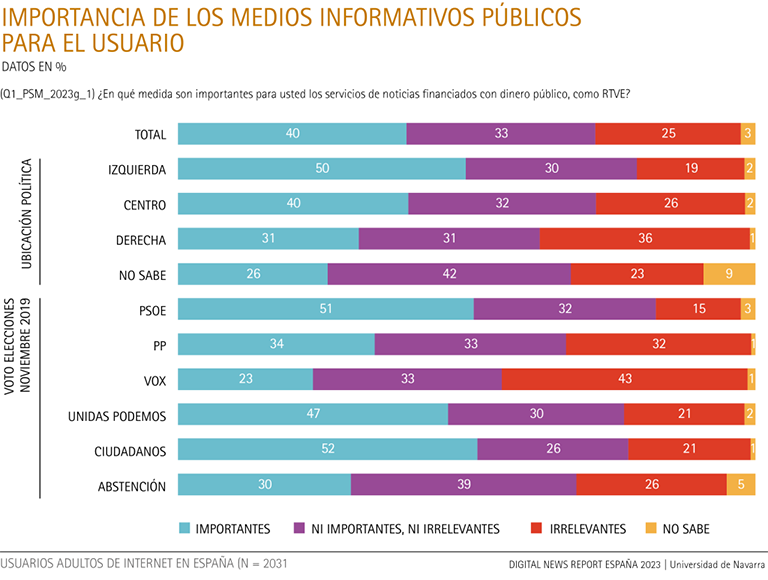
Half of left-leaning users think public media are important
According to ideological self-placement, respondents on the left are those who have the best opinion about the importance of public media in Spain, since 50% consider them to be relevant, while only two out of ten (19%) think that they are not important. However, for 36% of respondents on the right and 26% in the center, public media are not important. The difference is significant. Also significant is the opinion of 42% of those who opted for the no answer ("do not know") to qualify public media as neither important nor irrelevant.
According to vote recall in the November 2019 general election, for half of Ciudadanos (52%), PSOE (51%) and Unidas Podemos (47%) voters, and for 34% of PP voters, compared to 23% of Vox voters, public media are important (the difference is significant with respect to Vox voters). On the contrary, for 43% of Vox voters and 32% of PP voters public media are not important. Below average (26%), public media are irrelevant for 15% of PSOE voters, for 21% of Unidas Podemos and for 21% of Ciudadanos. Finally, for four out of ten Internet users who abstained (39%), public media are neither important nor irrelevant.
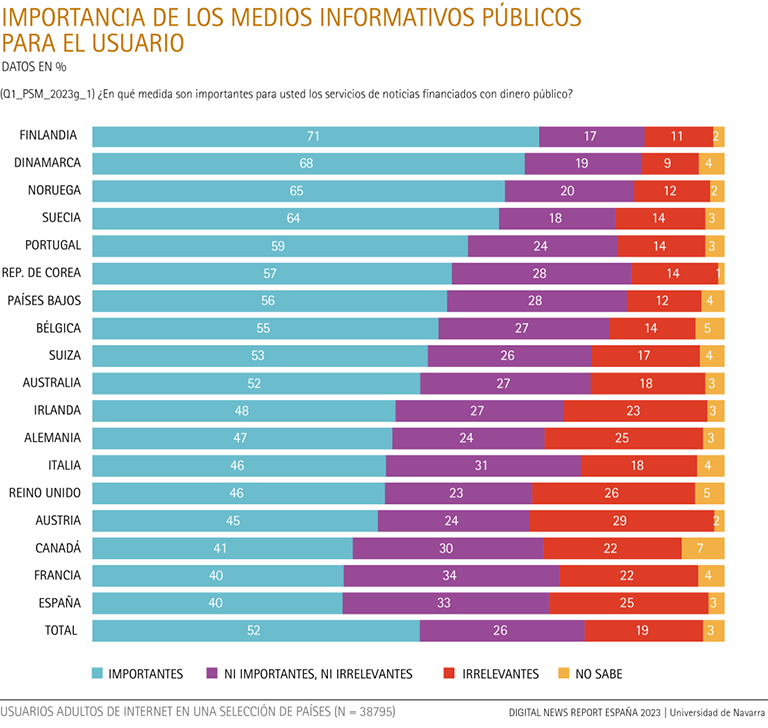
In the group of nineteen countries asked about the importance of public media for Username, Spain is in second to last place (40%, twelve percentage points below average). Finland (71%), Denmark (68%), Norway (65%) and Sweden (64%) are at the top of the list, followed by Portugal (59%).
Spain also has one of the highest percentages regarding the opinion that public media are not important (25%), a percentage similar to that of countries such as Germany (25%) or the United Kingdom (26%), six points higher than that of average (19%).
Furthermore, Spain is among the countries with the highest percentage of indifference to the importance of public media (33%), seven points above average (26%) and at the same level as Italy (31%), Canada (30%), France (34%) and Japan (35%).
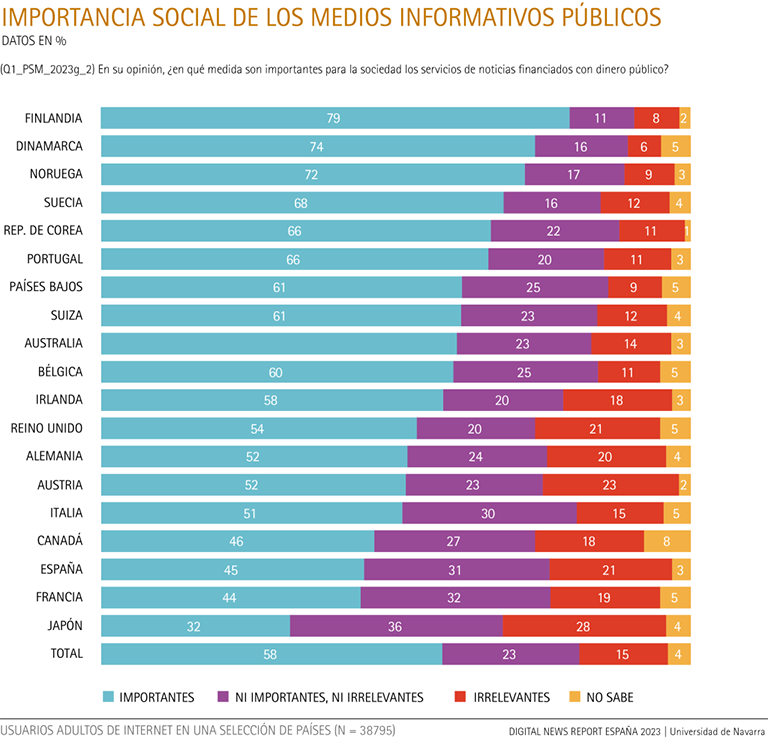
Less than half of Spanish respondents think public media are important for society
Are the public media important for society? In this question, despite the fact that the positive opinion of respondents obtains a higher percentage of responses than in the previous question (45%), Spain also occupies one of the last places in the list of countries in which it is included, thirteen points below the average (58%).
Again, the Nordic countries - where citizens have a high regard for their respective public media as institutions and as reliable news media - are at the top of the table: Finland (79%), Denmark (74%), Norway (72%) and Sweden (68%).
Spain is also among the four countries with the highest percentage of negative responses regarding the social relevance of public media (21%), six points higher than average (15%) and similar to France (19%), Germany (20%), the United Kingdom (21%) and Austria (23%).
Finally, a third of Spanish Internet users (31%) think that the public media are neither important nor irrelevant; this is eight points more than average (23%).
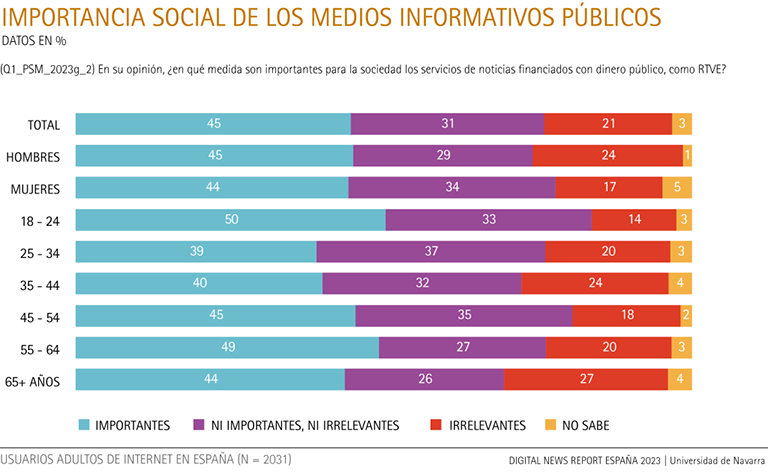
Half of 18-24 and 55-64 year-olds believe that public media are relevant to society
In Spain, there are no significant differences by gender among those who think that public media are important for society. By age, the percentage is higher among Internet users aged 45 and over (47%), compared to adults up to 44 (42%). The difference is significant, and yet the groups that attach most social relevance to public media are on both sides: those aged 18 to 24 (50%) and 55 to 64 (49%). On the contrary, the groups that give the least importance as an institution to the public media are those aged 25 to 34 (39%) and 35 to 44% (40%).
On the other hand, 24% of men and 17% of women share the opinion that public media are not important for society (the difference is significant). By age, only 14% of the youngest people hold this opinion and, at the opposite end of the scale, 27% of those over 65.
Finally, there are also more women (34%) than men (29%) who state that the public media are neither important nor irrelevant to society. According to age, this option reaches almost four out of ten Internet users (37%) between 25 and 34 years of age, and 35% between 45 and 54. Indifference is less widespread among those over 55 (27%).
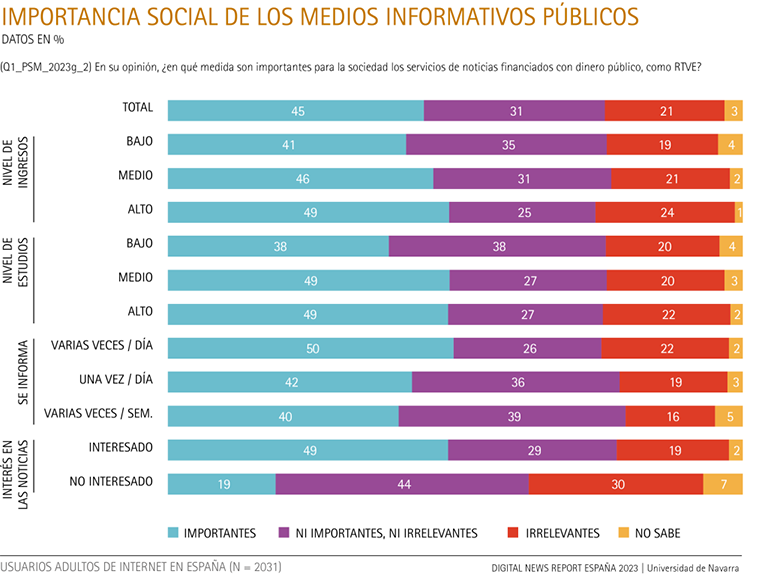
Significant differences are also found about respondents' views on the social relevance of public news media according to the variables of income, level of programs of study, frequency of access to online news and interest in news.
Half of high-income (49%), middle (49%) and high (49%) programs of study , as well as half of those who inform themselves several times a day (50%) and are interested in the news (49%) significantly better value the social relevance of public media than middle (45%) and low-income (41%) respondents, low programs of study level (38%), those who have no interest in the news (19%), or those who inform themselves only once a day (42%) and several times a week (40%).
On the other hand, there are no significant differences according to income level or programs of study; nor are there significant differences according to the frequency with which they access the news, for those who think that the public media are not socially important. Only three out of ten respondents who have no interest in the news think that the public media are socially irrelevant.
Lastly, there is a higher proportion of users who think that public media are neither important nor irrelevant for those with low (35%) or medium (31%) income levels; low level of programs of study (38%); for those who inform themselves once a day (36%) and several times a week (39%); and among those who say they are not interested in current affairs (44%). The differences are significant with respect to those who have high income (25%), medium (27%) and high (27%) levels of programs of study , inform themselves several times a day (26%) and claim to be interested in the news (29%).
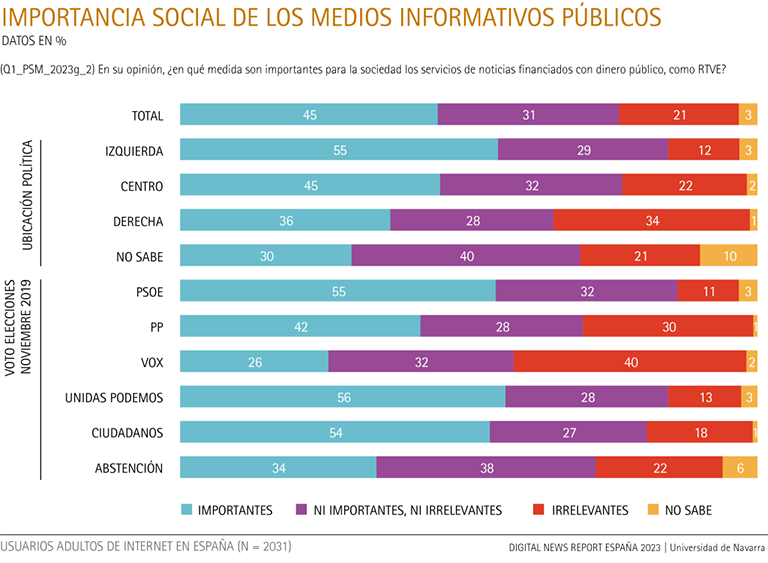
The view that public media are important for society receives more support from people on the left and center
According to ideological self-positioning, 55% of respondents on the left and 45% of those in the center think that public media are important for society, compared to 36% of those on the right. The difference with respect to those on the right is significant. At the same time, the difference between the 34% of users on the right who do not believe in the social relevance of the public media, compared to 22% of those in the center and 12% of those on the left, is also significant. Finally, 40% of those who are not located in any of the ideological positions think that public media are neither important nor socially irrelevant.
On the other hand, when considering the voting memory of the November 2019 general elections, again more than half of the voters of Unidas Podemos (56%), PSOE (55%) and Ciudadanos (54%) believe that public media are important for society. These percentages are significantly higher than those registered among PP (42%) and Vox (26%) voters for this response option. Among abstentionists, 34%.
On the other hand, 40% of Vox voters and 30% of PP voters think that public media are not important for society, percentages significantly higher than those obtained in this option by Ciudadanos (18%), Unidas Podemos (13%) and PSOE (11%) voters. Among those who abstained, the percentage is 22%, significantly higher than that obtained among PSOE and Unidas Podemos voters. Finally, it should be noted that, for four out of every ten Internet users who abstained in the aforementioned general elections (38%), the public media are neither important nor irrelevant to society.